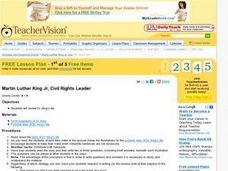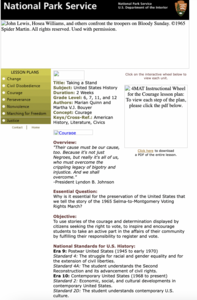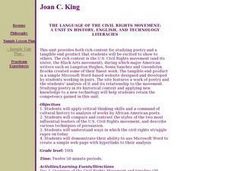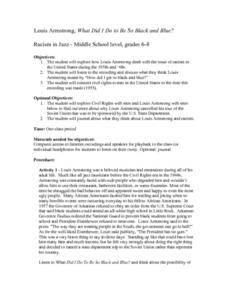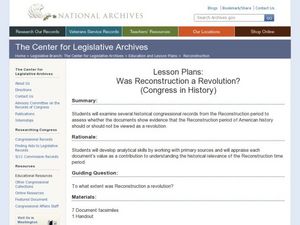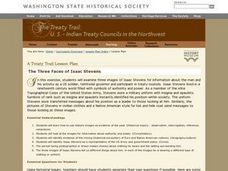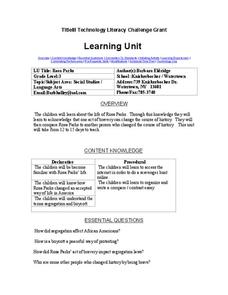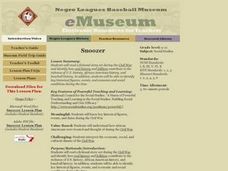Curated OER
Martin Luther King, Jr.: Civil Rights Leader
Learners investigate and read about the life and contributions of Martin Luther King, Jr. They listen to a biography and take notes, complete a pictorial story, and complete a writing assignment in response to questions about civil...
Curated OER
The Journey to Civil Rights
Students explore Civil Rights. In this Civil Rights lesson, students read about Ruby Bridges and define the words segregation and supremacy. Students make a timeline of important events in Civil Rights and write a paragraph about why the...
Curated OER
Rights-Minded
Young scholars expand their knowledge and understanding about the civil rights movement by investigating the lives of some of the people who contributed to it.
Curated OER
Why Can't I Vote?
Fourth graders take an unannounced test (failure is expected) and the top scores are rewarded with candy bars. They compare this test to the literacy tests given before 1960 and votes to candybars. They journal their responses.
Curated OER
Rosa Parks Changed the Rules
Students listen to a story about Rosa Parks and examine the bus seating rules of the 1950s. In this civil rights movement lesson, the teacher reads students a book about Rosa Parks, then students complete a worksheet with a diagram of...
Curated OER
Founding Documents of the Peace Corps
Students examine United States foreign policy in the period immediately following World War II through the activities of the Peace Corps.
Curated OER
MAPPING THE BLACK ATLANTIC
Young scholars examine the geographic characteristics of Western and Central Africa, the impact of geography on settlement patterns, cultural traits, and trade. They compare political, social, economic, and religious systems of...
Curated OER
Create Your Own Utopia
Students identify and examine the history of Utopian societies of the 19th century. They analyze the novel "The Giver" to determine whether this is a fair society or not. Students also examine the differences between Jonas' society and...
Facing History and Ourselves
Emmett Till: Choosing to Remember
Mamie Till, the mother of Emmett Till and civil rights activist, believed that her son's murder was the last straw before public outrage over racial injustice spilled over into the Civil Rights Movement of the 20th century. A history...
Curated OER
Antisemitism in Early America
Eleventh graders explore the rise of antisemitism in the United States in the early 20th century. After reading a passage concerning one man's ordeal, 11th graders discuss how the civil rights of minority groups has been viewed in...
Curated OER
Taking a Stand - 1965 Selma-to-Montgomery Voting Rights March
Learners examine the 1965 Selma-to-Montgomery Voting Rights March. They view pictures reflecting their perceptions of their most important rights as citizens, write journal responses, create collages illustrating courage, and read...
Curated OER
Negotiating And Resolving Conflict
Students study the art of negotiation and review problem-solving strategies. They use this information to solve problems that relate to school, United States, and world issues.
Curated OER
The Language of the Civil Rights Movement
Tenth graders develop a website documenting poetry integral during the civil rights movement in the United States. Working in pairs, 10th graders research the people and poetry of that was prevalent during the civil rights movement. ...
Curated OER
Racism in Jazz
Young scholars listen to the Louis Armstrong song, "What Did I Do to Be So Black and Blue?" and consider it as a protest song. They write in their journals about Armstrong, his music, and civil rights.
Curated OER
Stitching Truth Lesson One: What is Civil Society?
Ninth graders create a working definition of civil society. In this US History lesson, 9th graders create a list of terms that help make up the term civil society. Students examine the case study of life in Pinochet's Chile.
Curated OER
Awwwk…..Jim Crow Laws/ Constitutional?
Young scholars examine the constitutionality of Jim Crow Laws. In this civil rights lesson plan, students read excerpts of the U.S. Constitution as well as examples of Jim Crow Laws. Young scholars select Jim Crow laws and then find out...
Curated OER
Whose Business Is It Anyway? McCarthyism and Its Effect on Individual Rights
Students explore the concept of individual rights. In this McCarthyism lesson, students determine how government may affect the rights of individuals as they examine the Constitution, participate in class discussions, and research the...
Curated OER
Was Reconstruction a Revolution?
Students interpret historical evidence presented in primary and secondary resources. In this Reconstruction lesson, students research details pertaining to Congress's role in Reconstruction. Students use the provided worksheets to...
Curated OER
Get Out and Vote!
Students examine political activism. Pupils discuss forms of political activism, specifically voting. They listen to Public Service Announcements. Classmates write and record their own Public Service Announcements to encourage others...
Curated OER
The Three Faces of Isaac Stevens
Eighth graders examine three images of Isaac Stevens for information about the man and his activity as a US soldier, territorial governor and participant in treaty councils. Students are also shown Union Army pictures with different...
Curated OER
Rosa Parks
Students complete a variety of written and discussion activities regarding Rosa Parks and the Alabama bus boycott and how they changed an accepted way of life in America.
Curated OER
The Living Weapon
Students explore American history, military strategy and scientific discovery near the end of the World War II era. They examine the principles of the Cold War, pacifism, and the desire to keep government programs secret from the...
Curated OER
Snoozer
Students read a fictional story set during the Civil War and identify how oral history and folklore contribute to the richness of U.S. history, African American history, and baseball history.
Curated OER
Lesson Plan: Bringing Out the Vote
Students explore voter turnout, analyzing why Americans don't vote, and citizen activism through creating community publicity about the 2004 Presidential election.
